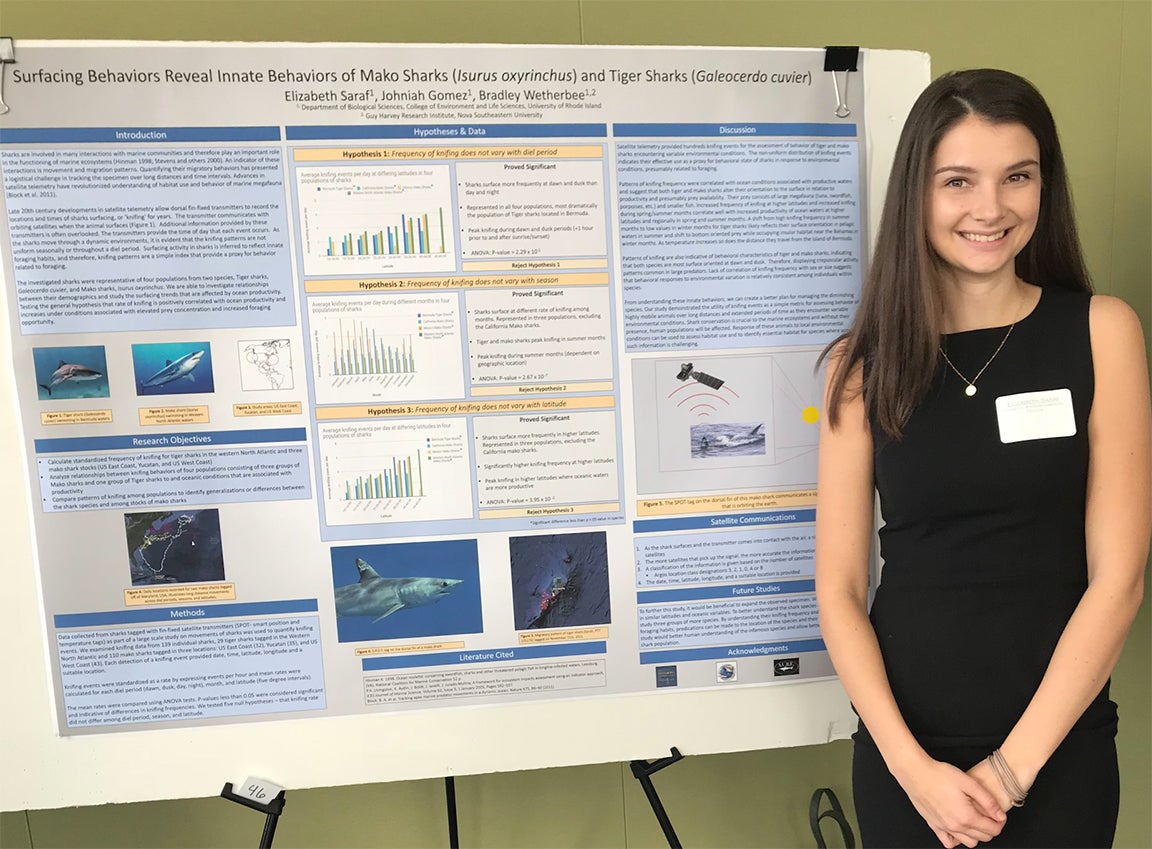KINGSTON, R.I. – May 10, 2019 – University of Rhode Island sophomore Elizabeth Saraf has been awarded the Ernest F. Hollings Scholarship from the National Oceanic and Atmospheric Administration, the most prestigious scholarship awarded to undergraduates studying the marine sciences. Since 2009, URI students have won 26 Hollings Scholarships and at least one every year. The total is one of the highest of any institution in New England.
The award provides Saraf with a total of $19,000 toward tuition in her final two years of undergraduate study plus a paid summer internship at a NOAA laboratory. In addition, she will attend two NOAA conferences and attend two scholarly conferences at which she will present the results of her internship research.
“I was so ecstatic when I heard I got the scholarship,” said Saraf, a marine biology major from Clarence, N.Y., who also participates in the URI Honors Program. “It’s an amazing achievement and such an honor. NOAA is such a huge institution for those of us interested in marine biology, and they have great internships and research projects.”
The scholarship program is designed to increase interest in oceanic and atmospheric science, increase support for environmental stewardship, and recruit students to public service careers at NOAA and other governmental science agencies.
In her two years at URI, Saraf has amassed an impressive list of research activities. As a first-year student she was named a Coastal Fellow and spent the summer helping Professor Bradley Wetherbee lead a shark camp for high school students while also studying shark “knifing” behaviors, which occur when they come to the surface and their dorsal fins appear above the water line. She is now collaborating with Wetherbee on a research paper examining which entities have jurisdiction over areas where sharks are knifing in local waters.
“Knifing usually indicates that sharks are eating, and it happens most frequently during dusk and dawn because that’s when the sun provides the most shadow, so sharks can look up and see their prey more easily,” Saraf explained.
While continuing her research on sharks, Saraf became involved in three more research projects this year. In collaboration with Visiting Professor Andrew Davies, she is mapping deep sea coral reefs in the Lau Basin of the Pacific Ocean by analyzing videos of research dives conducted during the last 15 years and looking for anthropogenic impacts on the reefs.
She is also working with Assistant Professor Carlos Prada on a study of the growth rates of two species of corals, one that lives in the deep sea and another that lives in shallow habitats. And she has begun a new project with Assistant Professor Jonathan Puritz, a laboratory study of oyster larvae and how their growth rates are affected by exposure to various nutrients and toxins.
“The ocean is so amazing, and there’s so much about it that interests me,” Saraf said. “I’m still interested in sharks, but I like coral reefs, too. Coral reefs are what most people think about when they think of the ocean, because there’s so much color and life there. There’s so much to study about them.”
Next fall, Saraf will spend the semester studying at the Bermuda Institute of Ocean Sciences, where she will scuba dive every morning, attend classes in the afternoon, and conduct a research project of her choice.
“I’ve never had complete control of an experiment before, so I’m really looking forward to studying something about corals,” she said, noting that she learned to dive at URI last year and will be practicing in Lake Erie this summer before going to Bermuda.
In addition to her interest in marine biology, Saraf also plays the viola and cello and considers a solo she performed with her high school orchestra before a full auditorium in 2017 her greatest achievement so far.
Looking ahead to the summer of 2020, Saraf hopes she will be interning at the NOAA Pacific Fisheries Science Center in Hawaii as part of her Hollings Scholarship.
“I want to focus on coral reef ecology and conservation, and I’ve heard that Hawaii is the place to do that,” she said. “And if everything pans out with NOAA, maybe I can stick with them in the future. But then again, who knows what else my future will bring.”

